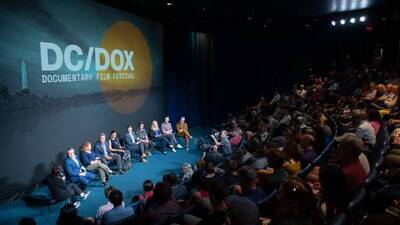Co-founder Shor, added, “This festival matters because this market matters. Washington, DC offers the documentary community access to journalists, opinion leaders and stakeholders like no other city. DC/DOX moves the art forward in the march towards audiences….Through our programming, panels and conversations, we believe we are answering the call from our community.”

In its second year, the festival presented 51 features and 47 shorts from 17 countries, from both emerging and established filmmakers, with a wide range of themes, perspectives, and styles. Each film was followed by a Q&A with filmmakers. “Sabbath Queen” director Sandi DuBowski described the warm reception from the audience who saw the film at the United States Navy Memorial theater. “I was so moved by the emotion and intensity of our DC/DOX screening, full of tears and laughter, in such an exquisite cinema.”
“Shaking it Up: The Life and Times of Liz Carpenter”: Abby Ginzberg’s documentaries are usually about people who had a significant impact on history but are not well known. For this film, her co-director was Christy Carpenter, her friend of many years and the daughter of the movie’s subject. Liz Carpenter was a pioneering journalist in the era when most newspapers refused to hire women or limited them to gossip and fashion. She left her home in Texas and went to Washington, D.C., to write about politics. She founded a wire service with her husband. Her duties included covering then-Senator Lyndon Baines Johnson and his wife, Lady Bird. When he became Vice President, he asked her to work in the White House. When he was sworn in as President following the shocking assassination of John F. Kennedy, she wrote his 58-word statement, assuring America and the world that he shared their sense of loss but was able to shoulder the responsibilities of the office.

Carpenter became one of LBJ’s closest advisors and organized Lady Bird Johnson’s unprecedented whistle-stop train journey through the South during his campaign and her advocacy for the environment and education. Later, she worked for women’s rights, including the Equal Rights Amendment. Carpenter’s remarkable life is presented with the kind of unquenchable good humor she always brought to politics, disarming opponents with charm and wit. The archival footage–from home movies to her many public appearances, her reflections and memories on C-SPAN, and comments from those who knew and worked with her–is well chosen to show her energy, intelligence, and unwavering commitment to the public good. Much of it is also very funny. Near the end, someone comments that hers was the era “when politics was not a blood sport.” The film will remind viewers that there once were such times and perhaps inspire them to try to bring them back.

